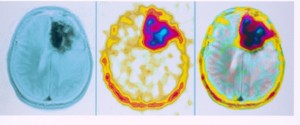It’s been three years since my diagnosis of brain cancer. I live my life in the shadow of “stages,” like a rocket booster: explosive, progressive, lethal. First it was anaplastic ependymoma, then astrocytoma, now a full-blown GBM (glioblastoma multiforme). I’m five craniotomies in, plus weeks and weeks of radiation, multiple chemotherapies and, most recently, “alternative approaches.” At least three times since my diagnosis, I’ve been told that I have six to nine months to live, or three to six, or less. I’ve also been told that I am strong, healthy, and that there are always “outliers.”
The minute I was diagnosed, my entire being went into overdrive. There was no roadmap for getting through the maelstrom that fell upon our family with such a diagnosis. Sure, there are pamphlets on every rack, and plenty of good advice from doctors. But nothing can prepare you for what exactly to do in such a situation.
Brittany Maynard, the 29-year old woman from California who recently moved to Oregon to avail herself of its Death with Dignity Act — often referred to as the assisted suicide law — was also diagnosed with a GBM. She has chosen to set her own terms as to how and when she will die, rather than let the disease take her on its unrelenting course. Her story has received worldwide attention. She has brought much-needed attention to brain cancer, which remains rare, lethal and incurable. She’s also and to broader personal issues about dying and living with dignity, and the choices we may or may not have the freedom, not to mention the courage, to make.
Brittany’s public, controversial, and very brave decision has helped me reflect upon my own three years of living with this disease, and the gripping fear I face with each MRI, as I hold my breath and watch the doctor pull up the screen on his laptop.
I can now read these images pretty quickly. I can watch the tumor expand and spread like a slow moving oil slick. There was a period when it seemed to be slowing down, but like the demonic hydra that it is, it resumes its encroachment. I continue traditional chemo but that, too, will soon run its course. Barring a last minute miracle cure, I will be truly at the end of the road.
I continue to try alternative methods with trepidation, skepticism, and hope. I’ve seen a spiritual medium who heals through channeling “entities,” while subjects wear white, drink “blessed water,” and follow a series of seemingly arbitrary rules purportedly designed to bestow healing power. To each his or her own.
My high school alma mater, a Quaker school in Philadelphia, held a special service in traditional fashion, to “hold me in the light, ” a way to channel healing energy in my direction. I’ve tried taking various supplements, and I’ve managed to limit sugar and carbohydrate consumption, often facing the nagging question, as a lover of foods of all kinds, “does it really matter when you have a terminal illness?”
I’ve taken the arduous, complicated and, for the moment, uncharted route of securing medical marijuana, and in particular the oil-based compound CBD, a.k.a. cannabidol. Doing so involved more risk and effort than anyone should have to face in seeking alternative approaches to their own cancer care. I suppose as marijuana laws and policies evolve it will get easier, but as it stands the process has taken up an enormous amount of scarce time, energy, and resources. I have no idea whether there will be any therapeutic effect. We shall see. I will, as I live and eventually die of this disease (no date set), try anything. I welcome any prayer, spirit, or compound that will help me proceed with dignity and happiness.
I have no problem with assisted suicide, death with dignity, or whatever other route anyone feels the need to choose in order to make an awful situation less so for themselves and their families. I have to admit that I felt irritated when I first learned of Brittany’s story. I wanted to shout, “WAIT! TOO SOON! TOO YOUNG! THERE’S HOPE!
But in the end, no one else can truly understand the pain, fear, and heartache experienced by a person in her place — or in mine. Without knowing the details of Brittany’s tumor progression, without experiencing her suffering, how can anyone truly understand her decision? What are her doctors telling her? Has she exhausted all treatment options? Is it too early? Most important, what is the disease doing to her?
Within the war-torn landscape of cancer, there are no winners or losers. Just people trying to live, and perhaps die, with the universal human dignity we desire.
I wish Brittany and her family love and whatever else it takes to make her final days, however many remain, what she wants them to be.

